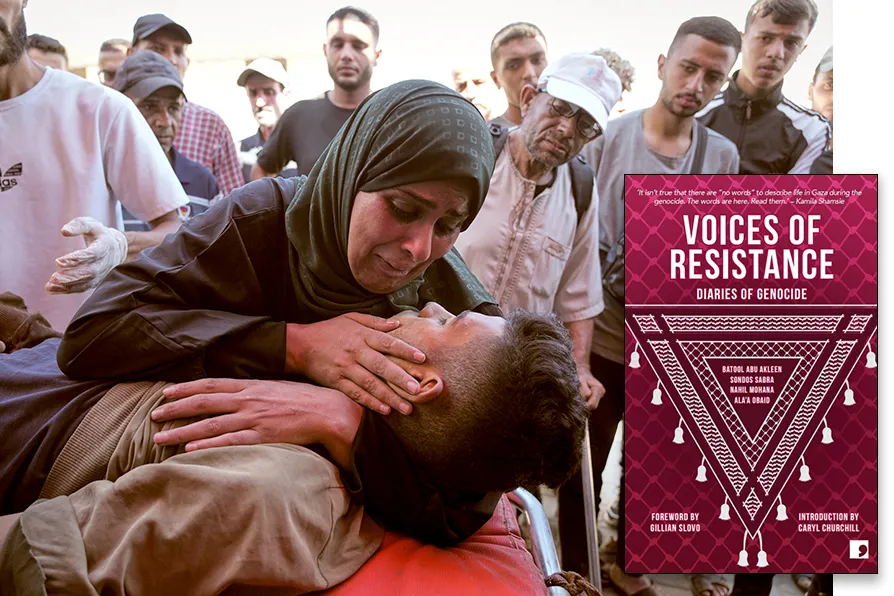DENNIS BROE searches the literary canon to explore why a duplicitous, lying, cheating, conning US businessman is accepted as Scammer-in-Chief
ANDY HEDGECOCK recommends that these beautifully written diaries from Gaza be essential reading for thick-skinned MPs

 Nabila Al Shaer mourns her son Jamil Al Shaer, 21, killed while trying to receive aid from the US-backed Gaza Humanitarian Foundation in the central Gaza Strip, at Al-Aqsa Hospital, July 31 2025 [Pic: AP Photo/Abdel Kareem Hana]
Nabila Al Shaer mourns her son Jamil Al Shaer, 21, killed while trying to receive aid from the US-backed Gaza Humanitarian Foundation in the central Gaza Strip, at Al-Aqsa Hospital, July 31 2025 [Pic: AP Photo/Abdel Kareem Hana]
Voices of Resistance (Diaries of Genocide)
Batool Abu Akleen, Nahil Mohana, Ala’a Obaid and Sondos Sabra, Comma Press, £10.99
ON July 23, the Daily Express printed the image of a starving Gazan child and acknowledged that his suffering “shames us all.”
The physical devastation wrought by Israel is apparent, even to the right-wing media, but what is the psychological impact of 21 months of relentless cruelty? The diaries presented in Voices of Resistance — by four women writers of Gaza — capture the grief, privation and fear of their everyday life; but they also highlight the resilience, humour and optimism of their communities.
Sondos Sabra begins by reflecting on her love of rainy mornings and her pride in the olive and prickly pear orchards her family have tended for over 80 years. Nothing seems exceptional about the family’s olive harvesting expedition on October 7 2023, until they hear explosions echoing in the distance.
Six days later, Sondos packs her “emergency bag” in anticipation of forced displacement. Switching between vivid reportage and freeform reflection, she links the chaos and anguish of missile and drone attacks to the history of the Palestinian people since the Nakba of 1948.
Sondos’s response to the resurgence of this catastrophe is often manifested through her relationship with her little sister, whose sparkle and vulnerability might stand as a metaphor for the resilience and vulnerability of Gaza: “Fear roots itself in our hearts… Fatima flings herself into my arms, clinging as if my embrace can shield her from the madness.”
In her diary entry for Valentine’s Day 2024, Ala’a Obaid reports the traumatic birth of her child, Ibrahim. Her closing comment on what should have been a joyful day captures a key message of these diaries: “The world should be ashamed of what is happening to us.”
Inevitably, there is sadness, despair and alarm: happy memories of laughter by the sea are tinged with grief for the death of a friend; hopes of a truce are dashed; and essential provisions become scarcer and more costly. But — against the odds — amusement, enjoyment and beauty remain. Ala’a marvels at a family clinging to a single bicycle laden with their worldly goods; admires a woman’s vivacity and lovely voice; and celebrates her seven-year-old son’s ability to live in the moment. As she says: “No matter how cruel the war, our love will always give us something worth holding onto.”
Batool Abu Akleen makes telling points about the subjective nature of pain. Gazan communities are, she suggests, insulated from the outward signs of tragedy because each person’s suffering is unique. She extends this idea into her work as a poetry editor, highlighting the absurdity of evaluating art at a time of genocide.
Nahil Mohana’s entries opens with a “sense of imminent dread” elicited by the bombing raids of October 2023 and swiftly moves on to the absurdity of a man being told by the Israeli authorities to leave an address he no longer occupies. The line between farce and tragedy is slender — it is noted that “the things we were able to laugh about yesterday are haunting us now” — but comedy endures. Nahil provides a glossary of neologisms relating to the sounds of bombing raids and a list of new records established by the privations being endured: for example, growing facial hair, suffering mosquito bites and climbing onto window sills.
These are thoughtful, powerful and beautifully written pieces. All four diarists see survival as an act of defiance. Schools close, tanks advance, drones and missiles fly; people stumble around in shock, suffer bereavement after bereavement, and prepare for death. On the other hand, there are tearful reunions, acts of compassion, comical disputes and unvanquished hopes that the slaughter and suffering will cease.
My MP is not one of the 221 who signed a letter calling for recognition of a Palestinian state. Perhaps I should send her a copy of this book, with Sondos Sabra’s entry for March 19 2025 clearly highlighted: “Do something, anything, please!” she writes. “I want to survive.”

ANDY HEDGECOCK relishes an exuberant blend of emotion and analysis that captures the politics and contrarian nature of the French composer

JOHN GREEN is stirred by an ambitious art project that explores solidarity and the shared memory of occupation











